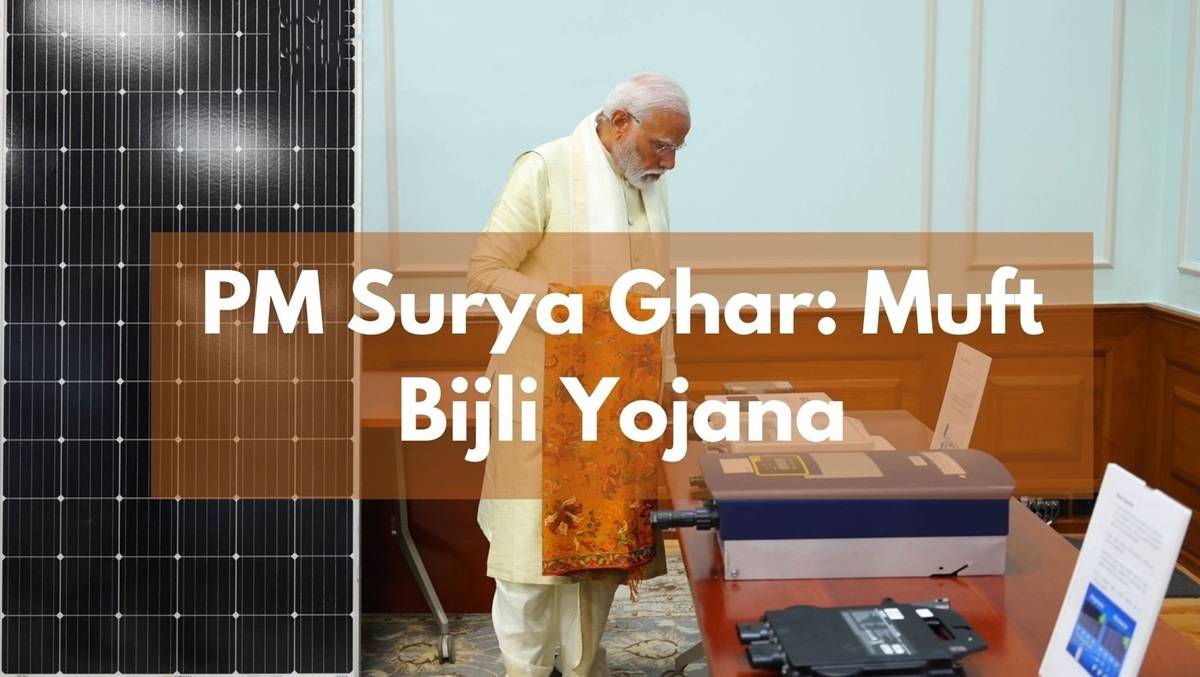
India's pursuit of sustainable development and energy independence has led to the inception of the PM Surya Ghar: Muft Bijli Yojana, a rooftop solar scheme aimed at lighting up one crore households across the nation. Launched by Prime Minister Narendra Modi, this initiative marks a significant step towards harnessing renewable energy sources and reducing the carbon footprint. The scheme's announcement, strategically timed before the 2024 Lok Sabha elections, underscores the government's commitment to promoting clean energy and enhancing the lives of its citizens. Finance Minister Nirmala Sitharaman's initial introduction of the scheme during the Interim Budget 2024-'25 laid the groundwork for its ambitious objectives and comprehensive implementation.
What is PM Surya Ghar: Muft Bijli Yojana?
PM Surya Ghar: Muft Bijli Yojana, formerly known as the rooftop solar scheme, represents a transformative effort to solarize one crore households in India. By installing solar panels on rooftops, the scheme aims to provide free electricity up to 300 units per month to eligible households, thereby reducing their reliance on conventional energy sources and cutting down electricity bills. This initiative not only promotes environmental sustainability but also empowers households economically by alleviating the burden of energy expenses.
PM Surya Ghar-Muft Bijli Yojana Objectives
The primary objectives of the PM Surya Ghar: Muft Bijli Yojana include:
-
Promoting Sustainability: Encouraging the use of solar rooftops for electricity generation to mitigate environmental impact and foster sustainable development.
-
Financial Relief: Providing free electricity up to 300 units per month to one crore households, thereby reducing their financial burden and enhancing their quality of life.
PM Surya Ghar-Muft Bijli Yojana Purpose
At its core, the PM Surya Ghar: Muft Bijli Yojana aims to achieve multiple goals, including:
-
Energy Access: Ensuring access to reliable and affordable electricity for all households, especially those in rural and remote areas.
-
Environment Conservation: Promoting the adoption of renewable energy sources to reduce greenhouse gas emissions and combat climate change.
-
Poverty Alleviation: Empowering low-income households by lowering their energy expenses and enhancing their economic resilience.
Who Can Apply For PM Surya Ghar-Muft Bijli Yojana?
The eligibility criteria for participation in the scheme are as follows:
-
Indian Citizenship: Applicants must be Indian citizens to avail themselves of the benefits of the scheme.
-
Income Limit: Annual family income should not exceed Rs 1.5 lakh, ensuring that the scheme targets economically disadvantaged households.
-
Non-Government Employees: Families with government employees are ineligible for the scheme, ensuring equitable distribution of benefits.
-
Caste Neutrality: The scheme is open to citizens of all castes, promoting inclusivity and equality.
-
Aadhar-Bank Linkage: An Aadhar card linked to the bank account is mandatory to facilitate direct subsidy transfers.
Subsidy Under PM Surya Ghar
The PM Surya Ghar initiative provides subsidies to encourage residential households to adopt solar energy. The subsidy structure is tailored to meet diverse energy needs:
-
Subsidy Structure: A subsidy of Rs 30,000 per kW for the first 2 kW, with an additional Rs 18,000 per kW for any added capacity up to 3 kW.
-
Maximum Subsidy: The total subsidy for systems larger than 3 kW is capped at Rs 78,000, providing significant financial assistance for larger installations.
Subsidies vary based on monthly electricity consumption:
-
Homes using 0-150 units/month get Rs 30,000 to Rs 60,000 for 1-2 kW systems.
-
Those using 150-300 units/month receive Rs 60,000 to Rs 78,000 for 2-3 kW systems.
-
Homes consuming over 300 units/month can install systems above 3 kW, capped at Rs 78,000.
This tiered subsidy system ensures equitable access to solar benefits, promoting adoption while reducing electricity costs and environmental impact.
PM Surya Ghar-Muft Bijli Yojana Benefits
The PM Surya Ghar: Muft Bijli Yojana offers a multitude of benefits to participating households and the nation as a whole, including:
-
Financial Savings: Reduced power bills result in substantial annual savings for households, enabling them to allocate resources to other essential needs.
-
Environmental Impact: The adoption of solar power contributes to environmental conservation by reducing reliance on fossil fuels and mitigating air pollution.
-
Employment Generation: The scheme generates employment opportunities in the solar energy sector, fostering economic growth and skill development.
-
Energy Security: Diversification of energy sources enhances energy security and resilience, reducing dependence on imported fossil fuels.
-
Technological Advancement: Encourages innovation and investment in solar energy technologies, driving technological progress and competitiveness.
PM Surya Ghar-Muft Bijli Yojana Documents Required
Applicants need to submit the following documents to avail themselves of the scheme's benefits:
-
Aadhar Card: Proof of identity and residence.
-
Address Proof: Document confirming the applicant's residential address.
-
Income Certificate: Verification of the applicant's annual family income.
-
Electricity Bill: Proof of current electricity consumption.
-
Ration Card: Additional proof of household identity and income.
-
Mobile Number: Contact information for communication purposes.
-
Passport Size Photo: Visual identification of the applicant.
-
Bank Account Passbook: Document confirming the linkage of Aadhar with the bank account for subsidy transfer.
Steps to Apply For PM Surya Ghar: Muft Bijli Yojana
The application process for the PM Surya Ghar: Muft Bijli Yojana is streamlined and user-friendly, comprising the following steps:
-
Registration: Applicants need to register on the official portal, providing essential details such as state, electricity distribution company, consumer number, mobile number, and email address.
-
Application Submission: Upon registration, applicants can submit their application for rooftop solar installation through the portal.
-
Feasibility Approval: After submission, applicants await feasibility approval, following which they can proceed with the installation process.
-
Installation: Registered vendors install solar panels on the rooftops of eligible households, adhering to specified guidelines and standards.
-
Net Meter Installation: Upon completion of the installation, applicants apply for a net meter to measure electricity generation and consumption.
-
Commissioning: A commissioning certificate is generated upon successful installation and inspection by the electricity distribution company.
-
Subsidy Disbursement: Applicants provide bank account details through the portal, facilitating direct subsidy transfer within 30 days of commissioning.
By adhering to these steps and fulfilling the requirements, eligible households can seamlessly benefit from the PM Surya Ghar: Muft Bijli Yojana, contributing to India's sustainable energy future.
Challenges of PM Surya Ghar-Muft Bijli Yojana
While the PM Surya Ghar: Muft Bijli Yojana offers immense potential for promoting solar energy adoption, it faces several challenges:
-
Awareness Gap: Many eligible households, especially in rural areas, lack awareness about the scheme's benefits and may not understand the advantages of solar power.
-
Technical Expertise: The installation and maintenance of solar panels require technical expertise and infrastructure, posing a challenge, particularly in resource-constrained regions.
-
Financial Barrier: Despite subsidies, the upfront cost of solar panel installation remains a hurdle for low-income households. Access to affordable financing options is crucial.
-
Intermittent Power Supply: Solar power generation is subject to weather conditions, leading to intermittent supply. Effective energy storage solutions are needed to address this challenge.
-
Policy Complexity: Inconsistent policies and regulations at the state and local levels can hinder solar adoption. Streamlining regulatory processes is essential.
-
Quality Assurance: Ensuring the quality and reliability of solar panels is vital. Poor-quality installations can lead to lower energy generation and higher maintenance costs.
-
Cultural Factors: Socio-cultural norms may influence the acceptance of solar energy. Tailoring outreach efforts to address cultural preferences is necessary.
-
Monitoring and Evaluation: Robust monitoring mechanisms are needed to assess the scheme's impact and identify areas for improvement.
Addressing these challenges requires a collaborative effort involving government agencies, private stakeholders, and local communities to ensure the scheme's success in transforming India's energy landscape.
By providing free electricity and substantial subsidies for solar panel installations, the scheme not only relieves financial burdens on households but also advances environmental conservation efforts. With its focus on inclusivity, technological innovation, and employment generation, the scheme holds the promise of driving socio-economic development while propelling India towards a cleaner, greener future. As the nation embraces solar energy, the PM Surya Ghar: Muft Bijli Yojana emerges as a beacon of progress and prosperity, poised to leave a lasting impact on generations to come
-
What Steps Are Required to Apply for Subsidy After Installing a Net Meter?
After the net meter is installed, a commissioning certificate will be issued to you via the portal after verification by DISCOM, indicating that you have now applied under this scheme. However, to receive the subsidy, you will need to upload a document. After the certificate is issued, you will need to submit bank account details and a cancelled check on the portal. Subsequently, the subsidy will be transferred to your bank account.
















